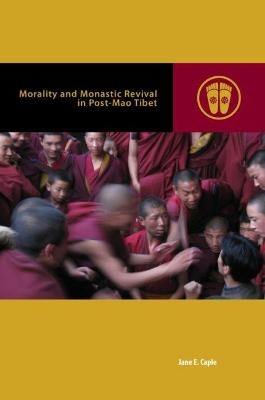
Morality and Monastic Revival in Post-Mao Tibet
Seiten
2019
University of Hawai'i Press (Verlag)
978-0-8248-6984-7 (ISBN)
University of Hawai'i Press (Verlag)
978-0-8248-6984-7 (ISBN)
The speed and extent of the Tibetan Buddhist monastic revival make it one of the most extraordinary stories of religious resurgence in post-Mao China. Drawing on the recent ""moral turn"" in anthropology, this volume explores the social and moral dimensions of monastic revival and reform across a range of Geluk monasteries in northeast Tibet.
The speed and extent of the Tibetan Buddhist monastic revival make it one of the most extraordinary stories of religious resurgence in post-Mao China. At the end of the 1970s, there were no working monasteries; within a decade, thousands had been reconstructed and repopulated. Most studies have focused on the political challenges facing Tibetan monasteries, emphasizing their relationship to the Chinese state. Yet, in their efforts to revive and develop their institutions, monks have also had to negotiate a rapidly changing society, playing a delicate balancing act fraught with moral dilemma as well as political danger. Drawing on the recent “moral turn” in anthropology, this volume, the first full-length ethnographic study of the subject, explores the social and moral dimensions of monastic revival and reform across a range of Geluk monasteries in northeast Tibet (Amdo/Qinghai province) from the 1980s on.
Author Jane Caple’s analysis shows that ideas and debates about how best to maintain the mundane bases of monastic Buddhism—economy and population—are intermeshed with those concerning the proper role and conduct of monks and the ethics of monastic-lay relations. Facing a shrinking monastic population, monks are grappling with the impacts of secular education, demographic transition, rising living standards, urbanization, and marketization, all of which have driven debates within Buddhism elsewhere and fueled perceptions of monastic decline. Some Tibetans—including monks—are even questioning the “good” of the mass form of monasticism that has been a distinctive feature of Tibetan society for hundreds of years. Given monastic Buddhism’s integral position in Tibetan community life and association with Tibetan identity, Caple argues that its precarity in relation to Tibetan society raises questions about its future that go well beyond the issue of religious freedom.
The speed and extent of the Tibetan Buddhist monastic revival make it one of the most extraordinary stories of religious resurgence in post-Mao China. At the end of the 1970s, there were no working monasteries; within a decade, thousands had been reconstructed and repopulated. Most studies have focused on the political challenges facing Tibetan monasteries, emphasizing their relationship to the Chinese state. Yet, in their efforts to revive and develop their institutions, monks have also had to negotiate a rapidly changing society, playing a delicate balancing act fraught with moral dilemma as well as political danger. Drawing on the recent “moral turn” in anthropology, this volume, the first full-length ethnographic study of the subject, explores the social and moral dimensions of monastic revival and reform across a range of Geluk monasteries in northeast Tibet (Amdo/Qinghai province) from the 1980s on.
Author Jane Caple’s analysis shows that ideas and debates about how best to maintain the mundane bases of monastic Buddhism—economy and population—are intermeshed with those concerning the proper role and conduct of monks and the ethics of monastic-lay relations. Facing a shrinking monastic population, monks are grappling with the impacts of secular education, demographic transition, rising living standards, urbanization, and marketization, all of which have driven debates within Buddhism elsewhere and fueled perceptions of monastic decline. Some Tibetans—including monks—are even questioning the “good” of the mass form of monasticism that has been a distinctive feature of Tibetan society for hundreds of years. Given monastic Buddhism’s integral position in Tibetan community life and association with Tibetan identity, Caple argues that its precarity in relation to Tibetan society raises questions about its future that go well beyond the issue of religious freedom.
Jane E. Caple is a Marie-Skłodowska Curie Research Fellow at the University of Copenhagen. Mark Michael Rowe is associate professor in the Department of Religious Studies, McMaster University.
| Erscheinungsdatum | 19.07.2019 |
|---|---|
| Reihe/Serie | Contemporary Buddhism |
| Mitarbeit |
Herausgeber (Serie): Mark Michael Rowe |
| Zusatzinfo | 9 black & white illustrations |
| Verlagsort | Honolulu, HI |
| Sprache | englisch |
| Maße | 152 x 229 mm |
| Themenwelt | Geisteswissenschaften ► Geschichte ► Regional- / Ländergeschichte |
| Geisteswissenschaften ► Religion / Theologie ► Buddhismus | |
| Sozialwissenschaften ► Politik / Verwaltung ► Europäische / Internationale Politik | |
| ISBN-10 | 0-8248-6984-2 / 0824869842 |
| ISBN-13 | 978-0-8248-6984-7 / 9780824869847 |
| Zustand | Neuware |
| Haben Sie eine Frage zum Produkt? |
Mehr entdecken
aus dem Bereich
aus dem Bereich
Universalgelehrter, Polarreisender, Entdecker
Buch | Hardcover (2024)
mareverlag
CHF 39,20


